Butler County | |
|---|---|
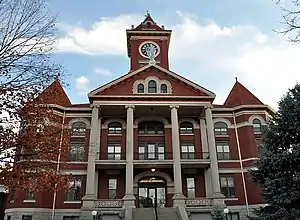 Butler County Courthouse in El Dorado (2011) | |
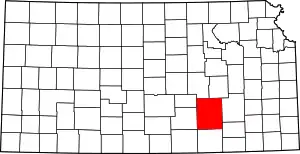 Location within the U.S. state of Kansas | |
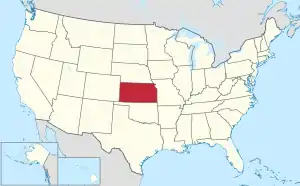 Kansas's location within the U.S. | |
| Coordinates: 37°47′N 96°50′W / 37.783°N 96.833°W | |
| Country | |
| State | |
| Founded | August 25, 1855 |
| Named for | Andrew Pickens Butler |
| Seat | El Dorado |
| Largest city | Andover |
| Area | |
| • Total | 1,447 sq mi (3,750 km2) |
| • Land | 1,430 sq mi (3,700 km2) |
| • Water | 17 sq mi (40 km2) 1.2% |
| Population | |
| • Total | 67,380 |
| • Estimate (2021)[2] | 67,889 |
| • Density | 47.1/sq mi (18.2/km2) |
| Time zone | UTC−6 (Central) |
| • Summer (DST) | UTC−5 (CDT) |
| Area code | 316 |
| Congressional district | 4th |
| Website | bucoks.com |
Butler County is a county in the U.S. state of Kansas and is the largest county in the state by total area.[3] Its county seat is El Dorado and its most populous city is Andover.[4] As of the 2020 census, the county population was 67,380.[1] The county was named for Andrew Butler, a U.S. Senator from South Carolina who coauthored the Kansas–Nebraska Act.
History
Early history
For many millennia, the Great Plains of North America was inhabited by nomadic Native Americans. From the 16th century to 18th century, the Kingdom of France claimed ownership of large parts of North America. In 1762, after the French and Indian War, France secretly ceded New France to Spain, per the Treaty of Fontainebleau. In 1802, Spain returned most of the land to France, but keeping title to about 7,500 square miles.
In 1803, most of the land for modern day Kansas was acquired by the United States from France as part of the 828,000 square mile Louisiana Purchase for 2.83 cents per acre. In 1848, after the Mexican–American War, the Treaty of Guadalupe Hidalgo with Spain brought into the United States all or part of land for ten future states, including southwest Kansas. In 1854, the Kansas Territory was organized, then in 1861 Kansas became the 34th U.S. state.
19th century
In 1855, Butler County was founded. It was named in honor of a U.S. Senator from South Carolina, Andrew Butler (1796-1857), who was one of the authors of the Kansas-Nebraska Act of 1854 and a strong advocate of Kansas becoming a slave state.[5]
In 1877, the Florence, El Dorado, and Walnut Valley Railroad Company built a branch line from Florence to El Dorado, in 1881 it was extended to Douglass, and later to Arkansas City.[6] The line was leased and operated by the Atchison, Topeka and Santa Fe Railway. The line from Florence to El Dorado was abandoned in 1942.[7] The original branch line connected Florence, Burns, De Graff, El Dorado, Augusta, Douglass, Rock, Akron, Winfield, Arkansas City.
In 1887, the Chicago, Kansas and Nebraska Railway built a branch line north–south from Herington to Caldwell.[8] This branch line connected Herington, Lost Springs, Lincolnville, Antelope, Marion, Aulne, Peabody, Elbing, Whitewater, Furley, Kechi, Wichita, Peck, Corbin, Wellington, Caldwell. By 1893, this branch line was incrementally built to Fort Worth, Texas. This line is called the "OKT". The Chicago, Kansas and Nebraska Railway was foreclosed in 1891 and was taken over by Chicago, Rock Island and Pacific Railway, which shut down in 1980 and reorganized as Oklahoma, Kansas and Texas Railroad, merged in 1988 with Missouri Pacific Railroad, and finally merged in 1997 with Union Pacific Railroad. Most locals still refer to this railroad as the "Rock Island".
21st century
In 2010, the Keystone-Cushing Pipeline (Phase II) was constructed north to south through Butler County (near Potwin, Towanda, Augusta, Douglass), with much controversy over tax exemption and environmental concerns (if a leak ever occurs).[9][10] A pumping station named Burns was built 2 miles north of Potwin, and new power lines were built from a high-voltage line 0.3 mile east of De Graff.[11]
In an unusual technical glitch, a farmstead about 4 miles northeast of Potwin became the default site of 600 million IP addresses (due to their lack of fine granularity) when the Massachusetts-based digital mapping company MaxMind changed the putative geographic center of the contiguous United States from 39.8333333,-98.585522 to 38.0000,-97.0000.[12][13]
Geography
According to the United States Census Bureau, the county has an area of 1,447 square miles (3,750 km2), of which 1,430 square miles (3,700 km2) is land and 17 square miles (44 km2) (1.2%) is water.[14] It is the largest county by area in Kansas.
Adjacent counties
- Chase County (northeast)
- Greenwood County (east)
- Elk County (southeast)
- Cowley County (south)
- Sumner County (southwest)
- Harvey County (west)
- Sedgwick County (west)
- Marion County (northwest)
Major highways
Demographics
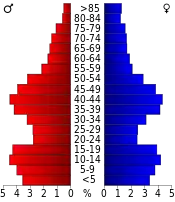
| Census | Pop. | Note | %± |
|---|---|---|---|
| 1860 | 437 | — | |
| 1870 | 3,035 | 594.5% | |
| 1880 | 18,586 | 512.4% | |
| 1890 | 24,055 | 29.4% | |
| 1900 | 23,363 | −2.9% | |
| 1910 | 23,059 | −1.3% | |
| 1920 | 43,842 | 90.1% | |
| 1930 | 35,904 | −18.1% | |
| 1940 | 32,013 | −10.8% | |
| 1950 | 31,001 | −3.2% | |
| 1960 | 38,395 | 23.9% | |
| 1970 | 38,658 | 0.7% | |
| 1980 | 44,782 | 15.8% | |
| 1990 | 50,580 | 12.9% | |
| 2000 | 59,482 | 17.6% | |
| 2010 | 65,880 | 10.8% | |
| 2020 | 67,380 | 2.3% | |
| 2021 (est.) | 67,889 | [2] | 0.8% |
| U.S. Decennial Census[17] 1790-1960[18] 1900-1990[19] 1990-2000[20] 2010-2020[1] | |||
Butler County is part of the Wichita, KS Metropolitan Statistical Area.
2000 census
As of the census of 2000, 59,482 people, 21,527 households, and 16,059 families resided in the county. The population density was 42 inhabitants per square mile (16/km2). There were 23,176 housing units at an average density of 16 per square mile (6.2/km2). The county's racial makeup was 94.94% White, 1.38% Black or African American, 0.91% Native American, 0.40% Asian, 0.03% Pacific Islander, 0.66% from other races, and 1.69% two or more races. Hispanic or Latino of any race were 2.25% of the population.
There were 21,527 households, of which 37.90% had children under the age of 18 living with them, 62.60% were married couples living together, 8.30% had a female householder with no husband present, and 25.40% were non-families. 21.90% of all households were made up of individuals, and 9.40% had someone living alone who was 65 years of age or older. The average household size was 2.67 and the average family size was 3.13.
In the county, the population was spread out, with 28.60% under the age of 18, 8.30% from 18 to 24, 28.80% from 25 to 44, 21.70% from 45 to 64, and 12.60% who were 65 years of age or older. The median age was 36 years. For every 100 females, there were 100.90 males. For every 100 females age 18 and over, there were 98.80 males.
The county's median household income was $45,474, and the median family income was $53,632. Males had a median income of $38,675 versus $26,109 for females. The county's per capita income was $20,150. About 5.40% of families and 7.30% of the population were below the poverty line, including 9.00% of those under age 18 and 6.40% of those age 65 or over.
Government
Presidential elections
| Year | Republican | Democratic | Third party | |||
|---|---|---|---|---|---|---|
| No. | % | No. | % | No. | % | |
| 2020 | 22,634 | 69.60% | 9,181 | 28.23% | 705 | 2.17% |
| 2016 | 19,073 | 68.96% | 6,573 | 23.77% | 2,011 | 7.27% |
| 2012 | 18,157 | 69.61% | 7,282 | 27.92% | 646 | 2.48% |
| 2008 | 18,155 | 65.13% | 9,159 | 32.86% | 559 | 2.01% |
| 2004 | 18,438 | 70.16% | 7,495 | 28.52% | 347 | 1.32% |
| 2000 | 13,377 | 63.69% | 6,755 | 32.16% | 870 | 4.14% |
| 1996 | 13,979 | 58.70% | 7,294 | 30.63% | 2,543 | 10.68% |
| 1992 | 9,166 | 38.79% | 7,029 | 29.75% | 7,434 | 31.46% |
| 1988 | 10,976 | 57.60% | 7,690 | 40.35% | 390 | 2.05% |
| 1984 | 12,976 | 66.33% | 6,371 | 32.56% | 217 | 1.11% |
| 1980 | 10,210 | 55.33% | 6,875 | 37.26% | 1,368 | 7.41% |
| 1976 | 8,390 | 48.45% | 8,540 | 49.32% | 386 | 2.23% |
| 1972 | 11,045 | 67.39% | 4,669 | 28.49% | 675 | 4.12% |
| 1968 | 7,893 | 50.79% | 5,952 | 38.30% | 1,696 | 10.91% |
| 1964 | 6,364 | 40.97% | 9,061 | 58.34% | 107 | 0.69% |
| 1960 | 10,059 | 58.37% | 7,112 | 41.27% | 61 | 0.35% |
| 1956 | 9,591 | 60.73% | 6,158 | 38.99% | 45 | 0.28% |
| 1952 | 10,179 | 65.04% | 5,359 | 34.24% | 113 | 0.72% |
| 1948 | 6,551 | 50.58% | 6,269 | 48.40% | 132 | 1.02% |
| 1944 | 7,064 | 53.50% | 6,084 | 46.08% | 55 | 0.42% |
| 1940 | 7,619 | 49.60% | 7,615 | 49.58% | 126 | 0.82% |
| 1936 | 6,204 | 39.99% | 9,283 | 59.84% | 27 | 0.17% |
| 1932 | 6,116 | 43.70% | 7,447 | 53.22% | 431 | 3.08% |
| 1928 | 10,168 | 79.43% | 2,533 | 19.79% | 101 | 0.79% |
| 1924 | 7,367 | 57.93% | 3,642 | 28.64% | 1,707 | 13.42% |
| 1920 | 6,821 | 60.56% | 4,112 | 36.51% | 331 | 2.94% |
| 1916 | 3,614 | 43.16% | 4,248 | 50.73% | 511 | 6.10% |
| 1912 | 971 | 18.30% | 2,005 | 37.79% | 2,330 | 43.91% |
| 1908 | 3,049 | 53.97% | 2,290 | 40.54% | 310 | 5.49% |
| 1904 | 3,306 | 61.90% | 1,540 | 28.83% | 495 | 9.27% |
| 1900 | 2,947 | 50.64% | 2,752 | 47.29% | 120 | 2.06% |
| 1896 | 2,414 | 44.91% | 2,926 | 54.44% | 35 | 0.65% |
| 1892 | 2,650 | 48.62% | 0 | 0.00% | 2,800 | 51.38% |
| 1888 | 3,172 | 55.36% | 1,616 | 28.20% | 942 | 16.44% |
Like of most of Kansas’ counties, Butler county is solidly Republican. In 2008, John McCain carried the county by a nearly two-to-one margin over Barack Obama. Since 1992, no Democratic candidate has received so much as forty percent of the county's vote.[22] The last Democratic candidate to carry the county was Jimmy Carter in 1976.[23]
Laws
Butler County was a prohibition, or "dry", county until the Kansas Constitution was amended in 1986 and voters approved the sale of alcoholic liquor by the individual drink with a 30% food sales requirement.[24]
Education
College
Unified school districts
- Bluestem USD 205
- Remington USD 206
- Circle USD 375
- Andover USD 385
- Rose Hill USD 394
- Douglass USD 396
- Augusta USD 402
- El Dorado USD 490
- Flinthills USD 492
- School district office in neighboring county
Private schools
Communities
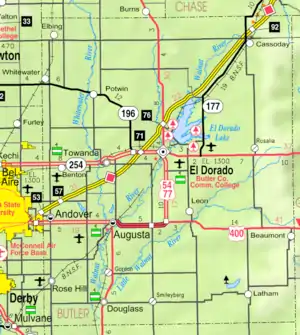
† means a community is designated a Census-Designated Place (CDP) by the United States Census Bureau.
Cities
Unincorporated communities
Ghost towns
- Aikman
- Alki
- Amador
- Browntown
- Chelsea (now lies under El Dorado Lake)
- Durachen
- Frazier
- Lorena
- Magna City
- Midian
- Oil Hill
- Oil Valley
- Ophir
- Plum Grove
- Providence
- Ramsey
- Salter
- Vanora
- Wingate
Townships
Butler County is divided into twenty-nine townships. The cities of Augusta and El Dorado are considered governmentally independent and are excluded from the census figures for the townships. In the following table, the population center is the largest city (or cities) included in that township's population total, if it is of a significant size.
See also
- Community information for Kansas
References
- 1 2 3 "QuickFacts; Butler County, Kansas; Population, Census, 2020 & 2010". United States Census Bureau. Archived from the original on August 15, 2021. Retrieved August 15, 2021.
- 1 2 "Annual Estimates of the Resident Population for Counties: April 1, 2020 to July 1, 2021". Retrieved October 18, 2022.
- ↑ "Kansas Land Area County Rank".
- ↑ "Find a County". National Association of Counties. Archived from the original on May 31, 2011. Retrieved June 7, 2011.
- ↑ Blackmar, Frank Wilson (1912). Kansas: A Cyclopedia of State History, Embracing Events, Institutions, Industries, Counties, Cities, Towns, Prominent Persons, Etc. Standard Publishing Company. pp. 261.
- ↑ Marion County Kansas : Past and Present; Sondra Van Meter; MB Publishing House; LCCN 72-92041; 344 pages; 1972.
- ↑ Railway Abandonment 1942
- ↑ "Rock Island Rail History". Archived from the original on June 19, 2011. Retrieved April 18, 2011.
- ↑ Keystone Pipeline - Marion County Commission calls out Legislative Leadership on Pipeline Deal; April 18, 2010. Archived October 22, 2011, at the Wayback Machine
- ↑ Keystone Pipeline - TransCanada inspecting pipeline; December 10, 2010.
- ↑ Keystone Pipeline - Burns Pumping Station - New Powerline Map; Trow Engineering Consultants and TransCanda; 2010.
- ↑ Hill, Kashmir (April 10, 2016). "How an internet mapping glitch turned a random Kansas farm into a digital hell". Fusion. Archived from the original on April 10, 2016. Retrieved April 10, 2016.
- ↑ Kansas couple sues over internet glitch targeting their home; The Wichita Eagle; August 8, 2016.
- ↑ "US Gazetteer files: 2010, 2000, and 1990". United States Census Bureau. February 12, 2011. Retrieved April 23, 2011.
- ↑ National Atlas Archived December 5, 2008, at the Wayback Machine
- ↑ "U.S. Census Bureau TIGER shape files". Archived from the original on May 23, 2017. Retrieved December 5, 2017.
- ↑ "U.S. Decennial Census". United States Census Bureau. Retrieved July 21, 2014.
- ↑ "Historical Census Browser". University of Virginia Library. Retrieved July 21, 2014.
- ↑ "Population of Counties by Decennial Census: 1900 to 1990". United States Census Bureau. Retrieved July 21, 2014.
- ↑ "Census 2000 PHC-T-4. Ranking Tables for Counties: 1990 and 2000" (PDF). United States Census Bureau. Archived (PDF) from the original on March 27, 2010. Retrieved July 21, 2014.
- ↑ "Dave Leip's Atlas of U.S. Presidential Elections".
- ↑ The New York Times Electoral Map (Zoom in on Kansas)
- ↑ David Leip's Presidential Election Atlas - 1976 statistics
- ↑ "Map of Wet and Dry Counties". Alcoholic Beverage Control, Kansas Department of Revenue. November 2006. Archived from the original on October 8, 2007. Retrieved December 26, 2007.
Further reading
- History of Butler County, Kansas; Vol P Mooney; Standard Publishing; 869 pages; 1916.
- An Illustrated Hand Book, Compiled from the Official Statistics, Descriptive of Butler County, Kansas; 66 pages; T.B. Murdock; 1887.
- Standard Atlas of Butler County, Kansas; Geo. A. Ogle & Co; 69 pages; 1905.
- Standard Atlas of Butler County, Kansas; Walter F. McGinnis & I.C. Thomas; 59 pages; 1885.
External links
- County
- Historical
- Maps